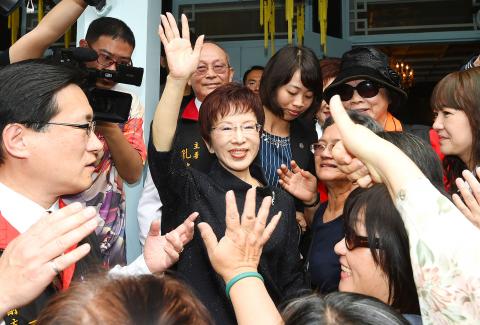Chinese Nationalist Party (KMT) Chairwoman Hung Hsiu-chu (洪秀柱) yesterday remained tight-lipped about her choices for the party’s future cadres, but listed several names that she said would be entrusted with important positions within the KMT.
Hung made the remarks during a visit to Chiang Kai-shek’s (蔣介石) mausoleum in Taoyuan’s Dasi Township (大溪) to commemorate the 41st anniversary of Chiang’s death in 1975.
She was accompanied by a group of KMT members, including KMT deputy caucus whip Lin Te-fu (林德福), Chiayi City Council Speaker Hsiao Shu-li (蕭淑麗), Taitung County Council Speaker Rao Ching-ling (饒慶鈴) and former KMT legislator Lin Kuo-cheng (林國正).

Photo: Chang Chia-ming, Taipei Times
Hung’s visit followed a trip to the mausoleum earlier yesterday by President Ma Ying-jeou (馬英九) and Vice President Wu Den-yih (吳敦義) to pay tribute to Chiang.
As Hung had previously indicated that she would drop “hints” about her selections during her scheduled visit to the Chiang mausoleum, reporters were on hand to hear the names.
“As you can see, many heads of city and county councils, elected representatives and legislators have joined me here today. They are all going to be entrusted with significant positions in accordance with the constituencies they represent and their respective capabilities,” Hung said.
Hung said their posts would be closely intertwined with the KMT’s electoral strategies for the 2018 local elections, as the party would require their grasp of local situations and efforts to promote party affairs at the grassroots level.
However, Hung said her lineup would be announced at different stages instead of all at once, adding: “You will know tomorrow [today] morning.”
The media reported that Hung is planning to designate more than one deputy secretary-general, with Hsiao, Rao and Lin Kuo-cheng all potential candidates.
Hung, the KMT’s ninth chairperson, said her heart was filled with mixed feelings when she stood in front of Chiang, who served as the KMT’s director-general, after having witnessed the party’s ups and downs in recent years.
“I feel like I am carrying a heavy burden, particularly considering the predicaments facing the party right now. We need greater wisdom and endurance to overcome these straits,” Hung said.
When asked for comment on former KMT secretary-general Lee Shu-chuan’s (李四川) proposal to abolish an annual forum between the KMT and the Chinese Communist Party, Hung said that the forum has its uses.
She said she would review and make improvements to the parts of the forum that the public deems “problematic.”
However, she added: “That does not mean we will stop holding the forum.”

Taiwan has received more than US$70 million in royalties as of the end of last year from developing the F-16V jet as countries worldwide purchase or upgrade to this popular model, government and military officials said on Saturday. Taiwan funded the development of the F-16V jet and ended up the sole investor as other countries withdrew from the program. Now the F-16V is increasingly popular and countries must pay Taiwan a percentage in royalties when they purchase new F-16V aircraft or upgrade older F-16 models. The next five years are expected to be the peak for these royalties, with Taiwan potentially earning

STAY IN YOUR LANE: As the US and Israel attack Iran, the ministry has warned China not to overstep by including Taiwanese citizens in its evacuation orders The Ministry of Foreign Affairs (MOFA) yesterday rebuked a statement by China’s embassy in Israel that it would evacuate Taiwanese holders of Chinese travel documents from Israel amid the latter’s escalating conflict with Iran. Tensions have risen across the Middle East in the wake of US and Israeli airstrikes on Iran beginning Saturday. China subsequently issued an evacuation notice for its citizens. In a news release, the Chinese embassy in Israel said holders of “Taiwan compatriot permits (台胞證)” issued to Taiwanese nationals by Chinese authorities for travel to China — could register for evacuation to Egypt. In Taipei, the ministry yesterday said Taiwan

Taiwan is awaiting official notification from the US regarding the status of the Agreement on Reciprocal Trade (ART) after the US Supreme Court ruled US President Donald Trump's global tariffs unconstitutional. Speaking to reporters before a legislative hearing today, Premier Cho Jung-tai (卓榮泰) said that Taiwan's negotiation team remains focused on ensuring that the bilateral trade deal remains intact despite the legal challenge to Trump's tariff policy. "The US has pledged to notify its trade partners once the subsequent administrative and legal processes are finalized, and that certainly includes Taiwan," Cho said when asked about opposition parties’ doubts that the ART was

If China chose to invade Taiwan tomorrow, it would only have to sever three undersea fiber-optic cable clusters to cause a data blackout, Jason Hsu (許毓仁), a senior fellow at the Hudson Institute and former Chinese Nationalist Party (KMT) legislator, told a US security panel yesterday. In a Taiwan contingency, cable disruption would be one of the earliest preinvasion actions and the signal that escalation had begun, he said, adding that Taiwan’s current cable repair capabilities are insufficient. The US-China Economic and Security Review Commission (USCC) yesterday held a hearing on US-China Competition Under the Sea, with Hsu speaking on